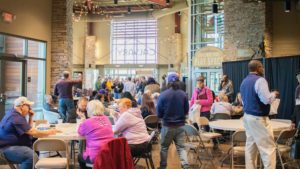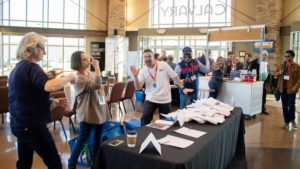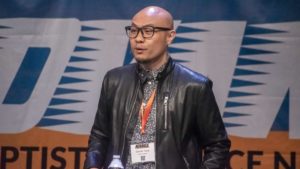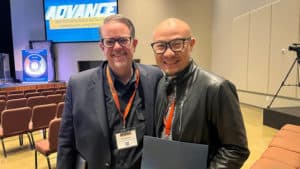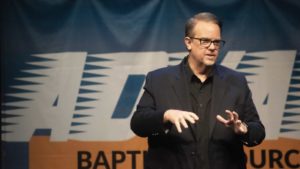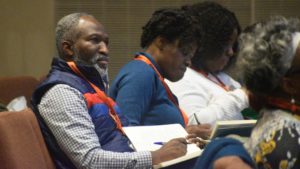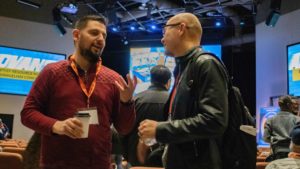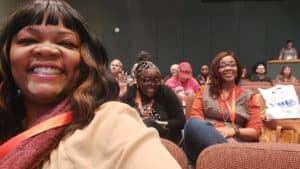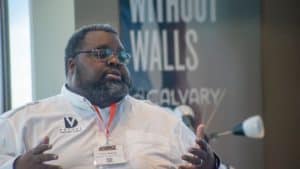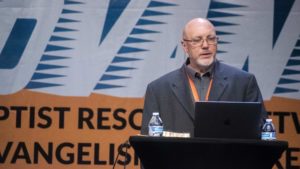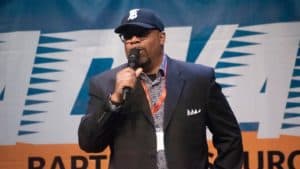STATE COLLEGE (BRN) – At 8:30 a.m. on Monday, March 21, the doors of Calvary Church – State College opened and nearly 200 pastors, missionaries and church goers from across Pennsylvania and South Jersey entered for the Baptist Resource Network’s (BRN) inaugural Advance Evangelism Conference.
Attendees were welcomed by the smiling faces of BRN team members and the ever-important smell of freshly brewed coffee. Early moments of registration and long awaited in-person reunions were followed by moments of worship led by Messiah University’s Seven and main speaking sessions featuring Director of the Send Institute Daniel Yang and Dr. Ed Stetzer of Wheaton College.
Breakout sessions led by BRN team members were also a part of the conference experience as well as, for the first time in a long time, fellowship with new and old friends.
“I love that the BRN is increasingly becoming like family. There were so many guys there [at the conference] that I could pick up right where we left off and talk about life and leadership in encouraging ways, while also meeting some other people and learning about them and their ministries,” said lead pastor of Restored Church Tim Walker.
Reaching the Digital World (Social Media/Social Ministry)
Daniel Yang kicked off the conference with his main session on Reaching the Digital World (Social Media/Social Ministry). Along with leading and overseeing all of the initiatives at the Send Institute, Yang is currently a Ph.D. Intercultural Studies student at Trinity Evangelical Divinity School. Throughout his years of ministry, he has also helped recruit, assess and train church planters through the Send Network and the Release Initiative.
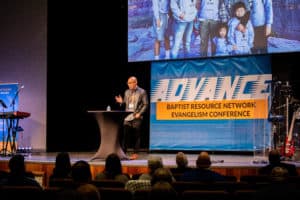
During his session, Yang spoke to his intercultural knowledge by touching on the beginnings of Pennsylvania and how our present questions of faith and future are not dissimilar to the ones William Penn asked in the birthing of Pennsylvania.
“In some ways, we’re in a unique season discussing the beginning of a new era of Christian ministry that will become the foundation for how future generations will develop their evangelistic imagination and their church planting strategies,” stated Yang.
Part of this new era of Christian ministry and evangelistic imagination being social media.
“Social media isn’t just some tool of a piece of technology. It’s a way of thinking, and because it’s a way of thinking, it’s not going away,” shared Yang.
Referencing 1 Corinthians 9:19-23, where Paul writes about becoming “all things to all people” for the sake of the gospel, Yang derived three categories of online discourse that could encourage evangelism through digital ministry and social media:
- The cultural and ethnic category of online witness
- The religious and political category of online witness
- The power and authority category of online witness
After an in-depth look into these categories and how they relate to modern evangelism, Yang assured the audience that social media is not a space to be feared, but a “place where both Christians and non-Christians can engage a common cause – even if it’s just to wish a mutual friend well before he goes into a scary surgery.”
He also encouraged engagement on social media as, it too, is a mission field where Christians are to become “everything that they need to become, within the limits of what Jesus and Paul modeled for us, but becoming all things to all people.”
Reaching the Post-COVID World
Dr. Ed Stetzer, executive director of the Wheaton College Billy Graham Center, kept with the theme of evangelizing in today’s culture as he followed Yang with the second main session of the day titled Reaching the Post-COVID World.
During the session, Stetzer chronologically walked through the defining moments of 2020, including the impeachment of President Donald Trump, COVID-19, the death of George Floyd, the riots, the election and the insurrection.
Not missing a beat on the hot topics of 2020, Stetzer used these historical moments to define the cultural convulsion of today’s era and how has, and is, impacting the process of evangelism.
“So what seemed to happen in 2020, is that people all accelerated on an issue,” said Stetzer, referencing issues of systemic racism, political views, pandemic ideology and gender identity.
“By the time you got through 2020, you could feel the division in your church.”
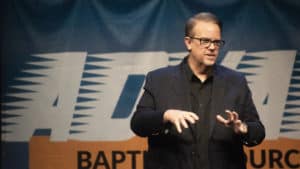
Stetzer then paralleled America’s cultural convulsion to the ways people are grouping themselves and how that is impacting churches across the nation.
“People want their ideology to align with what they hear at church,” said Stetzer. “People have left your church in the last two years because you weren’t enough of this or you were too much of that. So, what’s happening is people are sorting themselves into churches differently than they ever have before.”
This kind of cataloging has led to layers of disengagement within the church, with 1/3 of the church’s population proving to be more committed to church, another third hanging on or waiting, and the final third completely disconnected from the body.
Although the post-pandemic world has brought about significant changes to the American culture, Stetzer offered the following optimism as an encouragement to churches to keep sharing the gospel:
“I think that the next few months and years could be some of the finest moments in the church in our lifetime. I think, ultimately, people have seen that the modern experiment of culture is not working – culture is fraying, people are more divided…and I think we can point them to the Jesus who changes everything; the rock upon which we can stand.”
Reaching the Next Gen with a Biblical Apologetic and a Loving Hermeneutic
After a quick lunch and breakout sessions led by David Ludwig and Dr. Larry Anderson, BRN team members, and Dr. Chris Betner, pastor of DelVal East, Stetzer closed the conference with a session on reaching the next generation.
Stetzer started his second session off by sharing some generational statistics from Statista, the Billy Graham Center and Pew Research Center.
According to Statista, In 2020, Generation X (born 1965-1980) accounted for 65% of the U.S. population, while the latest generation, Generation Z (born 1997-2012) made up 67% of the population and the Millennial generation (born 1981-1996), representing the highest portion of the population, accounted for 72% of the country’s population.
With Millennials and Gen Zers accounting for most of the country’s population, and being that these are the two latest generations in existence, they tend to have a leg up on cultural influence.
Stetzer touches on this cultural influence by noting the “headwinds” and the “tailwinds” of coming out of COVID amongst these two generations. The “headwinds” refer to the challenges that may come when evangelizing to Millennials and Gen Zers, while the “tailwinds” refer to the opportunities that may arise to evangelize to these generations.
Headwinds coming out of COVID:
- Shrinking nominalism (non-engaging Christians)
- Attitude towards proselytizing
- Accelerating cultural shifts
- Image of the evangelicalism
Tailwinds coming out of COVID:
- Spiritual hunger
- The failure of the modern experiment
- Deployment for mission
- Tumult and opportunity
Though noting these cultural challenges and opportunities will grant an advantage in evangelizing, Stetzer warns that being a Christian in today’s culture will be harder.
“We need to be honest with people that it’s going to be harder to be a Christian in the next few years than it has been in past years,” shared Stetzer, who wrapped up his second session with an encouragement to work together.
“I really believe that in 2025 we can look back to 2022 and say this was the time we began to see the kind of spiritual awakening we are hunger for…it’s not easy, sisters and brothers, it’s a tumultuous and turbulent time, we’re gonna need one another.”
The Advance Conference wrapped up with a prayer and dismissal from BRN Executive Director Barry Whitworth and an invitation to the BRN’s fall conference Accelerate, which will feature keynote speaker Shane Pruitt, who is the Next Gen Director for the North American Mission Board.
Links of the replays of Advance’s main sessions will be sent to all our registrants. Others who are interested may contact the Help Desk.

